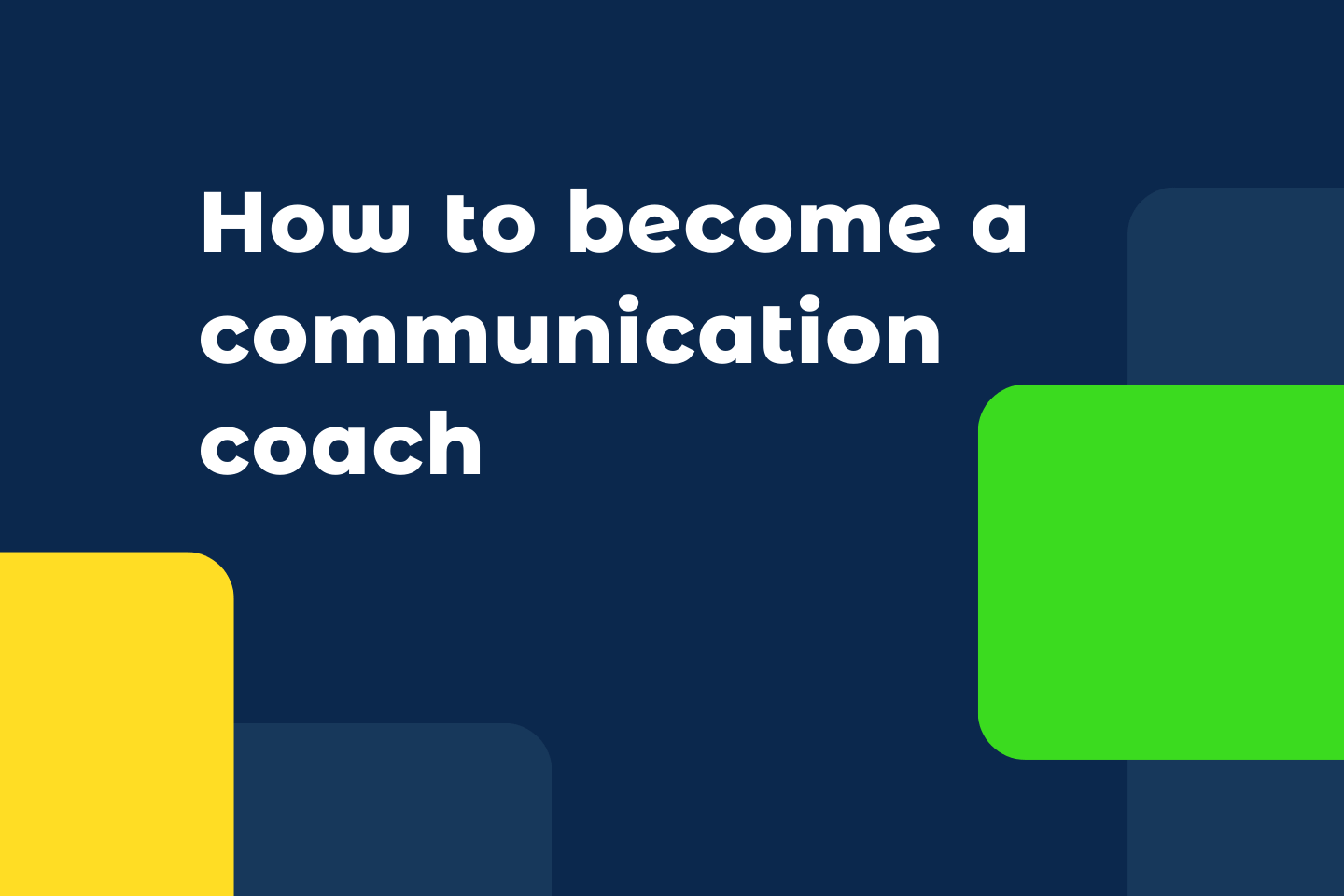Have you ever been captivated by the magic of words? Intrigued by how a well-spoken message has the potential to inspire, motivate, or even alter the trajectory of someone’s life? If you have, you might be stepping onto the path of becoming a communication coach.
Being a communication coach goes beyond grasping the technicalities of communication; it’s about aiding others in discovering their voice, crafting compelling narratives, and fostering meaningful connections.
In today’s read, we’ll provide you with the insights and guidance to turn your passion into a fulfilling career.
What is a Communication Coach?

A communication coach is a specialized professional tasked with the mission of honing an individual’s or a group’s communication skills across various contexts. These experts assist clients in articulating their thoughts and ideas succinctly and persuasively—be it for career growth, nurturing relationships, boosting self-confidence, or fostering personal development.
The role of a communication coach extends beyond simple conversation tactics; they are pivotal in personal and professional development. This is achieved through customized private coaching sessions with a personal communication coach or group coaching programs tailored to meet unique needs and objectives. In a professional setting, organizations often employ communication coaching as a tool to improve team dynamics, foster a collaborative environment, and ultimately drive business performance.
Who Works with a Communication Coach
Communication coaching is not exclusively for a select few. It spans across a broad spectrum of individuals and professionals who wish to polish their communication skills.
Professionals
In the corporate world, executives, managers, and team leaders who need to communicate effectively with their teams, stakeholders, or clients can significantly benefit from communication coaching. It can help them articulate their vision, negotiate deals, and manage conflicts more effectively.
Individuals Looking for Personal Growth
For individuals striving to boost their self-confidence and interpersonal skills, communication coaching can be a stepping stone. The best communication coach can help them express their thoughts more clearly and confidently in social settings, be it a job interview or a public speaking event.
3 Benefits of Communication Coaching

Communication coaching offers numerous benefits that can significantly enhance the personal life and career. Here are the key advantages clients can anticipate when they embark on this transformative journey.
1. Improved Relationships and Interpersonal Skills
Communication coaching enables clients to navigate complex dynamics, whether with a partner, colleagues, or family. They will become effective communicators and learn to express their needs effectively, resolve conflicts, and practice honesty. Distilling the essence of communication into how we give and receive feedback, timing our requests, and nurturing empathy are key aspects of this improvement.
2. Improved Career Trajectory
Communication coaching has the potential to significantly elevate the coachee’s career path. It optimizes vital professional skills including public speaking, conflict resolution, leadership aptitudes, and more. Effective communication is the cornerstone of gaining trust and establishing oneself as a role model, regardless of their hierarchical position within an organization.
Executive communication coaching, a niche field, aims to enhance leaders’ communication abilities and help them improve their executive presence. The coaching can help them articulate role expectations, provide feedback, and lead change management initiatives in a clear, empathetic manner.
3. Increased Confidence and Self-Esteem
The correlation between self-confidence and effective communication is strong. As the communication coach works, the client’s skills advance, and their self-esteem has the potential to flourish, enabling them to express their thoughts more openly and assertively. This remains true whether they are delivering a public speech or engaged in an intimate conversation.
True confidence is not about dominating a discussion; it involves confidently articulating their points and demonstrating self-assured body language. Proficiency in communication naturally fosters confidence, leading to smoother relationships, heightened respect, and a decrease in uncertainty – a frequent source of anxiety.
3 Key Skills and Qualities of a Communication Coach

To be an effective communication coach, you need to possess a particular set of skills. The ability to communicate is fundamental, but it’s merely the tip of the iceberg. Here’s a more comprehensive look at the key qualities the best coaches should epitomize.
1. Empathy
Empathy, the ability to understand and share the feelings of others, is a cornerstone in coaching. It allows the coach to connect with the coachee on a deeper level, fostering a safe space where the coachee feels valued and understood. Empathy enables the coach to view situations from the coachee’s perspective, which aids in providing insightful and personalized advice.
2. Active Listening
Active listening skills go beyond simply hearing the words being spoken – it’s about comprehending the complete message being sent. This involves observing the coachee’s body language, picking up on implicit meanings, and providing feedback. By actively listening, the coach can better identify the areas where the coachee needs improvement and devise strategies accordingly.
3. Adaptability
In communication coaching, one size does not fit all. Each coachee brings unique experiences, goals, and challenges to the table, and therefore, adaptability is key. A coach should be able to tailor their approach to suit the individual needs and learning styles of each coachee. This might involve adjusting techniques, setting personalized goals, or adopting a different communication style.
5 Steps to Become a Communication Coach

The road to becoming a successful coach demands dedication, continuous learning, and a grasp of a few crucial steps.
1. Obtain a Relevant Degree
A solid educational background is the initial step toward becoming a communication coach. A degree in fields such as communications, psychology, or business can provide a comprehensive understanding of human interaction and behavioral science. These disciplines help aspiring coaches understand various communication styles, negotiation skills, and conflict-resolution strategies.
2. Gain Practical Experience
Once you have a firm theoretical understanding, it’s time to gain practical experience. This could involve working in roles that require strong communication skills, volunteering for leadership positions, or getting involved in community outreach programs. Such experiences can provide first-hand exposure to diverse communication scenarios, which is invaluable in honing your skills.
3. Obtain Certification
While it’s not always mandatory, obtaining a coaching certification can enhance credibility and demonstrate your commitment to the profession. Numerous coaching organizations provide certification programs. These programs further train you in coaching techniques and ethics, equipping you with the tools required to conduct successful coaching courses.
4. Network and Build Your Professional Presence
Connecting with other professionals in the field is instrumental in building your reputation as a coach. Attend industry events, join online forums, and leverage social media to connect with peers and potential clients. Creating a professional website and sharing thought leadership content can also showcase your expertise and attract clients.
5. Start Your Coaching Practice
The final step is to start your coaching practice. This might begin with offering pro-bono services to gain testimonials or charging a minimal fee until you build your client base. If you’re doing it online, consider investing in white-label coaching software. Such a platform provides a variety of benefits, including personalized branding, streamlined processes, improved client engagement, and scalability. And, don’t forget to always learn and adapt to new communication practices and techniques, as this field is always evolving, and staying up-to-date is key to providing effective coaching and having a thriving coaching practice.
4 Challenges in Communication Coaching

Communication coaching, while rewarding, has its challenges. Here are some common hurdles communication coaches may face along with strategies to overcome them:
1. Building Trust With Coachees
As a communication coach, building trust with your coachees is essential for successful coaching outcomes. However, gaining this trust can be challenging, particularly when the coachee is initially resistant to coaching.
Solution
Establishing trust takes time and consistency. Start by creating a safe and non-judgmental space for the coachee. Be patient, transparent, and reliable in your interactions. As the coachee begins to see your commitment and the benefits of coaching, trust will naturally build.
2. Dealing With Resistance to Change
Resistance to change is a common hurdle in the coaching process. Coachees may feel comfortable with their current communication patterns and be hesitant to adopt new ones.
Solution
One effective strategy is to highlight the benefits of change by linking improved communication skills to the coachee’s personal and professional goals. Demonstrating the positive impact of change can motivate the coachee to embrace new communication strategies.
3. Individual Differences
Each coachee is unique in their learning styles, communication challenges, and personal objectives. This requires the coach to be adaptable and flexible in their approach, which can sometimes be challenging.
Solution
To effectively handle individual differences, evolve your coaching approach based on your client’s needs. Understand their goals, strengths, and areas of improvement. Tailoring your coaching techniques to each individual will make your sessions more effective and impactful.
4. Measuring Progress
Measuring the progress of a coachee’s communication skills can be somewhat subjective and difficult to quantify, making it a challenge for coaches.
Solution
One way to measure progress is by setting clear and measurable goals at the onset of the coaching journey. Regularly review these goals with your client and use them as a benchmark to evaluate improvement. Feedback from the client and others they interact with can also provide valuable insight into progress.
Wrapping up
Embarking on a journey as a communication coach offers immense fulfillment, unlocking numerous avenues for personal and professional development. It allows you to empower and guide others, aiding them in honing their communication skills to reach their goals.
The essence of success as a coach lies in maintaining openness to learning, adapting to diverse situations, and possessing an unwavering commitment to the growth and development of those you mentor.
